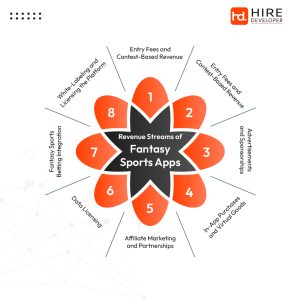Fantasy sports apps have gained tremendous popularity over the past decade, attracting millions of users who love competing with friends, analyzing player stats, and creating their dream teams. With this surge in demand, many wonder how these apps generate revenue. While users may see them as just a fun way to engage with sports, they are, in fact, highly profitable businesses employing various monetization strategies.
In this blog, we’ll explore the different ways fantasy sports apps make money, offering insights into their business models and revenue streams in 2025.
What is a Fantasy Sports App?
A fantasy sports app is an interactive digital platform that lets users create virtual teams made up of real-life professional athletes. These teams compete based on how the selected players perform in actual games. Users earn points depending on real-world stats like goals, assists, touchdowns, or other key performance indicators. The goal is to build the best-performing team, outscoring competitors and making the experience both exciting and strategic for sports enthusiasts. Whether you’re a casual fan or a seasoned sports analyst, fantasy sports apps bring the thrill of the game right to your fingertips.
How Fantasy Sports Apps Work
Fantasy sports apps offer an exciting way for fans to engage with their favorite sports by building and managing virtual teams. Here’s a breakdown of how these apps function:
- Creating Your Team: After registering on the app, users draft their fantasy teams by selecting real-life athletes from a specific sport—such as football, basketball, cricket, or baseball. The goal is to assemble a balanced squad that maximizes performance potential.
- Managing Your Budget: Many apps implement a salary cap or virtual budget, meaning users must strategically build their teams while staying within financial constraints. This adds a layer of skill and decision-making to the process.
- Tracking Real-Time Performance: As the actual games unfold, the app tracks player performances live. Statistics such as goals, assists, points, runs, and other key metrics are converted into fantasy points based on a predefined scoring system.
- Earning Points & Ranking Up: Players earn points based on their real-world performances. The app updates team rankings in real-time, allowing users to see how they stack up against others in their league or competition.
- Transfers & Trades: To keep the game dynamic, users can modify their teams by making transfers or trades. This lets them adjust for player injuries, changes in form, and upcoming matchups—helping to optimize their team’s overall performance.
Business Model of Fantasy Sports Apps
Fantasy sports apps function by allowing users to create virtual teams composed of real-world athletes and compete based on their performances in actual games. The two main categories of fantasy sports platforms include:
- Daily Fantasy Sports (DFS): Short-term contests where users draft teams for a single day or week, with cash prizes awarded based on performance.
- Season-Long Fantasy: Traditional leagues where users manage their teams throughout a sports season.
Key stakeholders in this industry include:
- Users: Sports fans who participate in fantasy leagues and contests.
- Sponsors: Companies looking to market their products through app sponsorships.
- Advertisers: Brands that use fantasy sports apps to reach targeted audiences.
- App Owners: The developers and businesses operating the fantasy sports platforms.
How Fantasy Sports Apps Make Money
Fantasy sports apps have transformed into billion-dollar enterprises by tapping into the passion and competitive spirit of sports enthusiasts. These platforms use diverse revenue models to keep users engaged while ensuring a steady stream of profits. Below, we explore the top monetization strategies that drive success in this industry:
1. Entry Fees and Contest-Based Revenue
One of the primary ways fantasy sports apps make money is through paid contests. Many apps allow users to participate in cash contests where they pay an entry fee to join. The total prize pool is collected from these entry fees, and the platform takes a percentage as its earnings before distributing the winnings.
Example:
- A fantasy football contest has 1,000 participants, each paying a $10 entry fee.
- The total prize pool is $10,000.
- The platform takes a 10% cut ($1,000), leaving $9,000 to be distributed among winners.
This model ensures that apps generate revenue every time a contest is held, making it one of the most lucrative strategies.
2. Subscription Plans
Many fantasy sports apps offer subscription plans that provide users with additional benefits, such as advanced analytics, exclusive leagues, and expert advice. These plans are often tiered, with premium members getting access to better tools and data to enhance their gaming experience.
Subscription Tiers:
- Basic (Free): Limited access to contests and basic player statistics.
- Premium ($5/month): Advanced analytics, live match updates, and performance tracking.
- VIP ($20/month): Exclusive contests, expert team-building strategies, and priority customer support.
This model helps apps generate steady monthly revenue while enhancing user engagement.
3. Advertisements and Sponsorships
Advertising is another major revenue stream for fantasy sports apps. With millions of users actively engaged, brands find these platforms ideal for reaching a sports-loving audience.
Types of Ads Used:
- Banner Ads: Displayed on the app’s homepage or contest pages.
- Video Ads: Short promotional videos users watch before accessing certain features.
- Sponsored Content: Articles or tips from brands promoting their products.
Many apps also secure sponsorship deals with sports leagues, teams, or broadcasting networks, which further boosts revenue.
4. In-App Purchases and Virtual Goods
To enhance user experience, fantasy sports apps offer various in-app purchases, such as virtual goods, power-ups, and customization options.
Common In-App Purchases:
- Boosters: Users can buy power-ups to increase their chances of winning.
- Player Stats Upgrades: Detailed insights on player performance for better decision-making.
- Exclusive Team Customization: Unique logos, themes, or player avatars.
These purchases enhance user engagement while generating additional income for the app.
5. Affiliate Marketing and Partnerships
Fantasy sports apps often partner with other businesses to promote products or services related to sports and gaming. When users purchase through affiliate links, the app earns a commission.
Example:
- A fantasy sports app partners with a sports merchandise store.
- Users see promotional links to buy jerseys, caps, and other gear.
- For every purchase made through the app, it receives a percentage of the sale.
Affiliate marketing is a win-win for both the app and the partnered brands, creating an additional revenue stream without disrupting user experience.
6. Data Licensing
With millions of users engaging with fantasy sports apps daily, these platforms collect vast amounts of data related to player preferences, user behavior, and game strategies. This data is valuable to sports analysts, advertisers, and betting companies.
Apps can license anonymized user data to:
- Sports analytics firms.
- Research institutions studying fan engagement.
- Betting companies looking to enhance their odds-making algorithms.
While this method raises privacy concerns, apps ensure they comply with data protection regulations to maintain user trust.
7. Fantasy Sports Betting Integration
In some countries where sports betting is legal, fantasy sports apps integrate betting features to attract a broader audience. Users can place bets on real matches, leveraging their fantasy sports knowledge.
Betting Features Include:
- Live Betting: Users place bets during a live match based on real-time performance.
- Odds-Based Contests: Fantasy leagues with dynamic odds based on player statistics.
- Parlay Bets: Multiple bets combined for higher payouts.
Since betting is a high-risk, high-reward industry, apps offering this feature often generate substantial revenue.
8. White-Labeling and Licensing the Platform
Some fantasy sports companies allow other businesses to use their platform under a white-label agreement. This means businesses can launch their own fantasy sports app using the existing infrastructure while paying a licensing fee.
White-Label Business Model:
- A company pays an annual licensing fee to use the fantasy sports platform.
- The app is branded under their name but runs on the original platform’s software.
- The original platform earns money without having to manage additional users directly.
This strategy enables fantasy sports platforms to monetize their technology without needing to expand their user base.

Challenges in Monetizing Fantasy Sports Apps
Monetizing fantasy sports apps isn’t straightforward. Developers must navigate legal complexities, technical demands, user engagement issues, and security concerns to ensure profitability.
- Legal and Regulatory Barriers
Fantasy sports laws vary by region—some classify them as skill-based games, while others treat them as gambling. In October 2024, the UK’s Gambling Commission took legal action against Sorare for operating without proper licensing, highlighting the ongoing compliance challenges platforms face.
- Technical Scalability
A seamless user experience requires real-time data processing, secure payments, and personalized content. Traffic spikes during major sporting events can cause system slowdowns or crashes, making a robust, scalable infrastructure essential for success.
- User Retention and Engagement
With intense competition, keeping users engaged is a major challenge. Platforms like Fantasy Premier League (FPL) have grown to 11.5 million players by incorporating advanced analytics and dynamic game mechanics that enhance realism and strategy.
- Effective Monetization Strategy
Fantasy sports apps rely on in-app purchases, subscriptions, and ads for revenue. However, users often resist paywalls, making it crucial to strike a balance between profitability and a satisfying user experience.
- Data Security and Privacy
Handling vast amounts of user data requires strict compliance with GDPR, CCPA, and other data protection laws. Any security lapse can lead to breaches, legal trouble, and lost user trust.
Future of Fantasy Sports Monetization
The fantasy sports industry is experiencing rapid growth, fueled by advancements in technology and evolving consumer preferences. As the market expands, businesses are exploring new and innovative ways to generate revenue. Some of the key monetization strategies driving this industry forward include:
- Blockchain & NFTs
Empowering users with true ownership of unique digital assets tied to their fantasy teams, ensuring authenticity, rarity, and seamless trading opportunities within a decentralized ecosystem.
- Cryptocurrency Payments
Providing users with a secure, fast, and transparent way to make transactions, eliminating third-party fees while enhancing financial accessibility for fantasy sports enthusiasts worldwide.
- AI-Driven Personalization
Leveraging artificial intelligence to analyze user behavior, recommend optimal strategies, and deliver engaging, tailored experiences that maximize participation, enjoyment, and winning potential in fantasy leagues.
- Global Expansion
Expanding into emerging fantasy sports markets worldwide, adapting to regional preferences, and creating opportunities for new users to engage with their favorite sports in innovative ways.
Launch Your Revenue-Generating Fantasy Sports App Now with HireDeveloper
Fantasy sports apps have built a thriving industry by leveraging multiple revenue streams, including entry fees, subscriptions, advertisements, affiliate marketing, in-app purchases, and sports betting. As the industry continues to grow, new opportunities like blockchain and AI-driven personalization are shaping the future of monetization.
For these apps to remain profitable and sustainable, they must balance innovation, compliance, and user experience. As competition increases, adapting to emerging trends and expanding into new markets will be crucial for long-term success.
If you’re a startup aiming to enter the booming fantasy sports industry, now is the perfect time to act. One of the most crucial steps to success is partnering with the right development team.
HireDeveloper is a leading name in fantasy sports app development, recognized for building innovative, user-friendly apps that not only enhance user engagement but also drive significant revenue.

